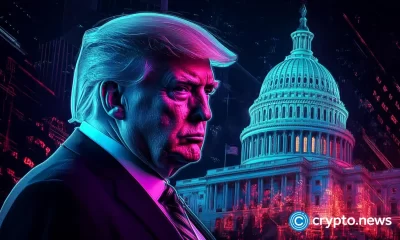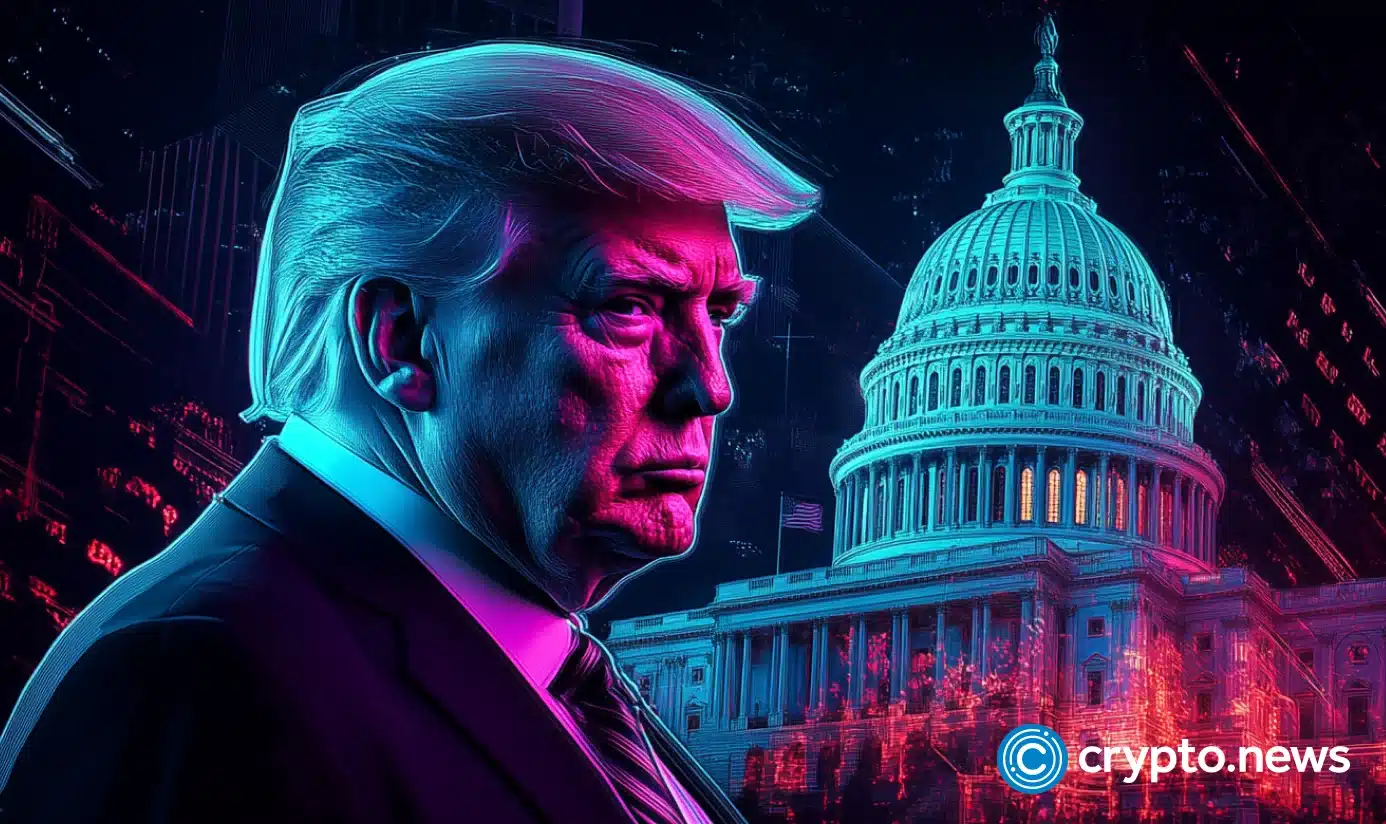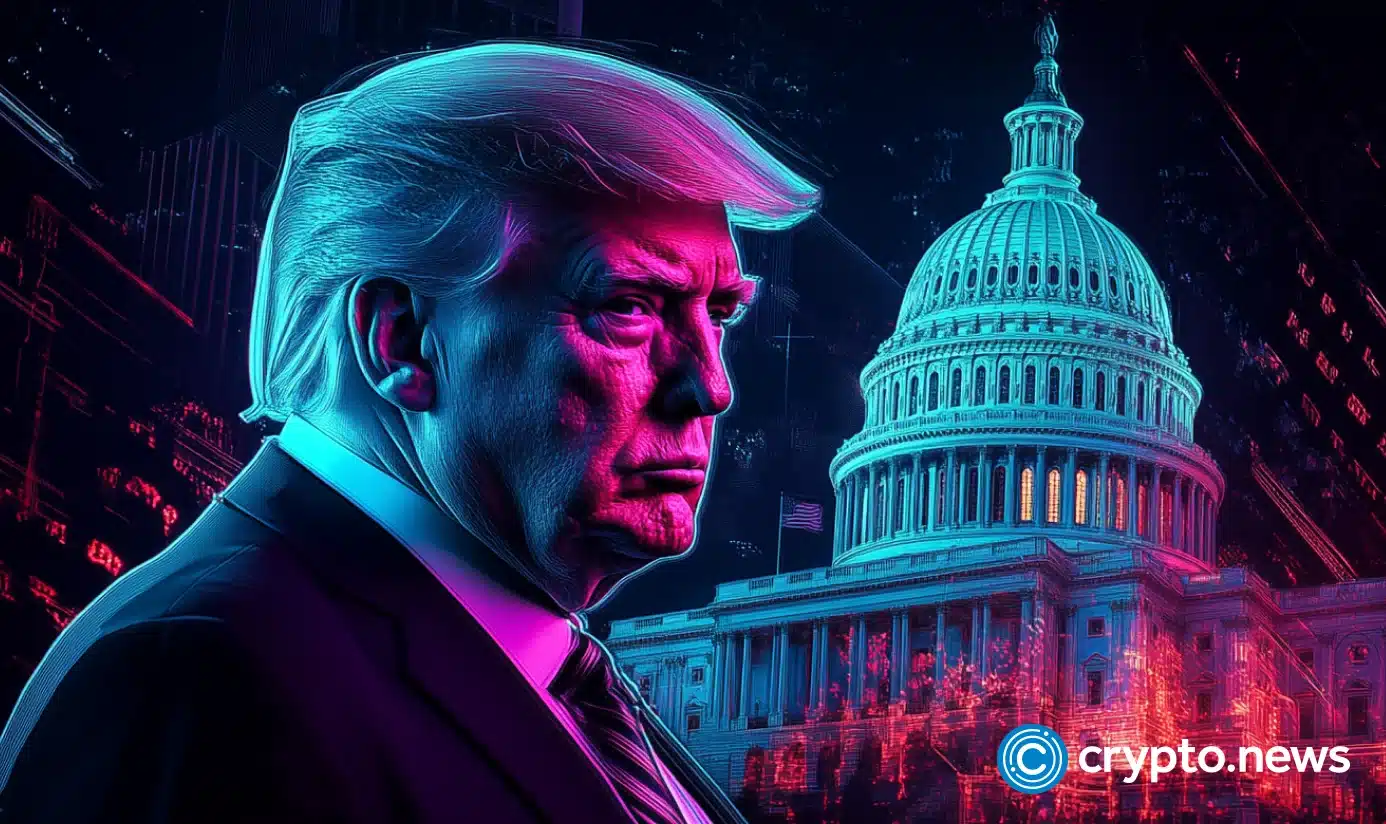Donald Trump
Is Trump Just Using Crypto Voters? Harris isn’t Innocent Too
Published
1 month agoon
By
admin

Trump’s crypto plans sound perfect on paper — but what’s the catch? Could Harris’ understated approach hold the key to a safer, smarter crypto future?
As the 2024 U.S. presidential race enters its final stages, both Donald Trump and Kamala Harris are ramping up efforts to woo a growing but often overlooked group of voters — crypto voters.
Trump, with his newly launched World Liberty Financial (WLF) token and plans for a “Bitcoin (BTC) and Crypto Advisory Council,” has positioned himself as a vocal supporter of crypto and decentralized finance.
On the other hand, Vice President Harris has quietly begun outlining policies aimed at protecting crypto investors, particularly in Black communities, through her Opportunity Agenda.
Let’s dive deeper into what Trump and Harris are offering to the crypto community, how their policies stack up, and what it means for voters who are hoping to see clearer regulations—and maybe a little more digital coin in their pockets.
Trump’s crypto courtship
Donald Trump has transformed his stance on crypto in a way that speaks directly to a key group of voters, a calculated move to tap into the rising influence of the crypto community in America.
It all started in May when Trump’s campaign began accepting crypto donations, a notable change from his earlier skeptical views. This was followed by several strategic moves aimed at convincing the crypto community that he’s their candidate.
By June, Trump publicly threw his support behind Bitcoin miners, expressing his hope that the remaining Bitcoin would be mined “right here in America” – a key message for those concerned about the exodus of mining operations to countries like Russia and Kazakhstan.
But Trump didn’t stop there. His appearance at the Bitcoin Conference in Nashville at the end of July marked a crucial moment in his crypto campaign.
Standing before a packed room of crypto advocates, Trump not only promised to establish a national Bitcoin reserve if elected—an unprecedented move—but he also vowed to fire SEC Chairman Gary Gensler.
This promise, met with a standing ovation, struck a chord with crypto voters, many of whom see Gensler as an obstacle to the industry’s growth due to his firm stance on regulating digital assets like stocks and bonds.
The creation of a national Bitcoin reserve, paired with his pledge to form a Bitcoin and Crypto Advisory Council, set him apart from his opponents, especially in a political arena where other candidates have remained cautious on crypto.
Beyond policy promises, Trump has also made highly visible gestures to show his support for crypto. During a campaign stop at Pubkey, a Bitcoin-themed bar in New York, Trump became the first former U.S. president to use cryptocurrency in a transaction, buying a dozen burgers using Bitcoin.
At the center of Trump’s crypto efforts lies his personal project, WLF, a DeFi platform launched in September 2024. Marketed as a crypto bank where users can borrow, lend, and invest, WLF is clearly designed to lure crypto voters by offering them something tangible.
The platform’s native token, WLFI, was introduced with much fanfare, aiming to raise $300 million at a valuation of $1.5 billion. Yet, the project has struggled to meet its ambitious goals, with only $12.9 million raised so far.
More controversial is the token allocation—Trump and his family are poised to receive 75% of the net protocol revenue, raising questions about transparency and how much of the project is for the benefit of its users versus the Trump family.
WLF claims to be apolitical, yet the timing and Trump’s heavy involvement make it clear that this is as much a political play as it is a financial one. The project’s roadmap includes bold promises, but its slow progress and the outsized financial benefits for the Trump family have sparked skepticism.
Still, Trump’s supporters view the project as part of his broader narrative of financial independence and American economic strength, tied neatly to his political messaging.
Harris’s cautious approach to crypto
While Trump has taken an aggressive and hands-on approach to wooing the crypto community, Kamala Harris has chosen a more measured path.
Harris, the current Vice President, has not made crypto a centerpiece of her campaign, but recent moves suggest she is aware of the growing importance of digital assets and their impact on voters.
The first real signs of Harris’ approach came during a roundtable event at the Democratic National Convention in Chicago, where her senior campaign adviser, Brian Nelson, shed some light on her potential policies.
Nelson made it clear that Harris intends to support policies that allow emerging technologies like crypto to grow while ensuring they are adequately regulated. Though the message was vague, it marked the first public stance from Harris’ camp on the matter.
This careful dance became more apparent when Harris recently introduced her “Opportunity Agenda”, a broader economic plan aimed at improving financial inclusion.
One key aspect of this agenda is the protection of crypto investors, particularly Black Americans, a demographic where over 20% own or have owned digital assets.
Harris has promised to build a regulatory framework to ensure that the benefits of crypto can be enjoyed safely without the risks of fraud, volatility, or market manipulation.
However, while Harris has started laying out her views on paper, her direct engagement with the crypto community has been rocky at best.
A virtual town hall hosted by the ‘Crypto For Harris’ campaign was supposed to be a moment to rally support from the digital asset space, but the event fell flat.
Lacking interaction and with Harris herself notably absent, the town hall left prominent figures like Tyler Winklevoss and Jake Brukhman frustrated.
Winklevoss went as far as to call it a “clown show,” while Brukhman criticized the format for failing to capture the essence of a town hall—engagement and dialogue.
The event, instead, relied on pre-recorded speeches from political allies like Senators Gillibrand and Schiff, making it feel more like a lecture than a conversation.
Despite the misstep, Senate Majority Leader Chuck Schumer, a major Democratic figure, did his best to fill the gap, emerging as a surprise ally for crypto. Schumer promised that crypto is “here to stay no matter what” and pledged to push for sensible regulation before the end of the year.
Interestingly, Harris’ campaign has also received quiet support from notable crypto figures. Chris Larsen, the co-founder of Ripple (XRP), has donated over $1 million in XRP to Harris’ campaign, expressing confidence that she would bring a “more pragmatic approach and clear rules” to the crypto industry — something he believes is missing under the current administration led by SEC Chairman Gensler.
While Harris hasn’t gone as far as Trump in embracing crypto, she’s also made subtle moves to distance herself from the more anti-crypto voices within the Democratic Party, such as Senator Elizabeth Warren.
Her cautious approach might not generate standing ovations like Trump’s promises to fire Gensler or create a Bitcoin reserve, but it offers a path for crypto that leans toward stability and investor protection — appealing to voters who seek progress without the chaos.
What are the odds?
As the 2024 presidential race intensifies, the odds of each candidate winning have shifted dramatically in the past few days, and the crypto market’s bullish sentiment might be playing a role.
According to a popular betting contest on Polymarket, which has attracted over $2.06 billion in bets, Trump currently holds a 60.1% chance of victory, compared to Harris’ 39.8%.
This is a stark contrast to just a few weeks ago when the two were neck and neck at nearly 50% each. In fact, in mid-September, Harris was leading with a 52% edge over Trump’s 46%.
A lot has changed in the past few days, particularly in the crypto market. The newfound bullishness in digital assets, particularly Bitcoin, seems to be influencing voter sentiment.
As of Oct. 18, Bitcoin is trading just shy of $70,000, hovering around $68,700, its highest levels in months, reflecting the growing impact of the crypto market on political outcomes.
As we head closer to Election Day, the tides could shift again, depending on the performance of the crypto market and any last-minute developments from both campaigns. The coming days will be critical in defining both the race and the future of crypto policy in the U.S.
Source link
You may like


Gary Gensler’s Departure Is No Triumph For Bitcoin


Magic Eden Token Airdrop Date Set as Pre-Market Value Hits $562 Million


Blockchain Association urges Trump to prioritize crypto during first 100 days


Pi Network Coin Price Surges As Key Deadline Nears


How Viable Are BitVM Based Pegs?


UK Government to Draft a Regulatory Framework for Crypto, Stablecoins, Staking in Early 2025
Donald Trump
Gary Gensler’s Departure Is No Triumph For Bitcoin
Published
22 mins agoon
November 22, 2024By
admin

As I’ve explained previously, I don’t think Donald Trump actually gives a damn about Bitcoin; at best, he’s a shitcoiner who wants in on the scam. Having said that, it is fair to say that Trump adopted a pro-crypto stance during his campaign. And indeed, his promise at Bitcoin 2024 to fire Gary Gensler on “day one” of his presidency seems to have already resulted in the SEC chairman announcing his resignation.
An optimistic scenario (as for example suggested by Trey Walsh) is one in which the Democrats now (also) adopt Bitcoin as part of their party platform. But given how many other seemingly neutral topics get unnecessarily politicized (the COVID vaccines are perhaps the best recent example of this), I wouldn’t be surprised to see the opposite happen.
As the upcoming Trump administration is gearing up to establish a regulatory landscape facilitating full-on anything-goes multicoinery, and with Gary Gensler gone, we could well see the most atrocious scam coins proliferate and soar— before they inevitably implode. And as people over the next four years get rug pulled, dumped on, and otherwise defrauded, I could also easily imagine a political response from the other side of the aisle that fails to recognize the distinction between Bitcoin and the World Liberty Financials of the world altogether. They could turn against all of cryptocurrency even more than they already have— Bitcoin not excluded.
Of course, this is all speculation; I have no crystal ball here. But in a few years from now, bitcoiners might find themselves in between polarized positions from both major American political parties. Nocoiners to the left of me, shitcoiners to the right, here I am, stuck in the middle with you.
This article is a Take. Opinions expressed are entirely the author’s and do not necessarily reflect those of BTC Inc or Bitcoin Magazine.
Source link
Blockchain
Blockchain Association urges Trump to prioritize crypto during first 100 days
Published
1 hour agoon
November 22, 2024By
admin

The Blockchain Association has called on president-elect Donald Trump and Congress to prioritize five key actions during the administration’s first 100 days to establish the U.S. as a global leader in cryptocurrency innovation.
In an open letter, the industry group outlined specific measures to address regulatory challenges and support the domestic digital asset economy.
The Blockchain Association is a U.S.-based crypto lobbying group advocating for a regulatory framework for cryptocurrencies. They emphasized lifting the bank account ban on crypto companies and appointing new leadership for the SEC, Treasury Department, and IRS.
They also proposed creating a cryptocurrency advisory committee to work with Congress and federal regulators.
Five priorities for Trump’s first 100 days
The letter highlighted five steps aimed at fostering a supportive environment for crypto businesses and users:
- Creating a Crypto Regulatory Framework
The Blockchain Association urged Congress to draft comprehensive legislation for cryptocurrency markets and stablecoins. This framework, it argued, would balance consumer protection with innovation. Stablecoins are digital currencies tied to traditional assets, such as the U.S. dollar, offering price stability for users. - Ending the Debanking of Crypto Companies
The group expressed concern over crypto businesses losing access to banking services. These companies rely on traditional banks to handle payroll, taxes, and vendor payments. Without banking access, their operations can be severely disrupted. - Reforming the SEC and Repealing SAB 121
The association called for a new SEC chair to replace what it described as a hostile regulatory approach under the current leadership. It also recommended reversing SAB 121, an accounting rule that imposes strict requirements on crypto-related businesses. - Appointing New Treasury and IRS Leadership
Tax policies for cryptocurrencies, such as the proposed Broker Rule, have been criticized for potentially stifling innovation and driving companies offshore. The letter urged the administration to appoint leaders who would support privacy and foster a fair tax environment for digital assets. - Establishing a Crypto Advisory Council
The letter proposed a council to facilitate collaboration between the industry, Congress, and federal regulators. Public-private partnerships, it said, could create rules that protect consumers while encouraging innovation.
Crypto collaboration
In their letter, the Blockchain Association emphasized its readiness to work with the administration and 100 member organizations to ensure the U.S. regains its position as a financial and technological innovation leader.
“We stand ready to work with you to ensure the United States can regain its position as the crypto capital of the world,” the Blockchain Association wrote in the letter.
This letter comes as Trump adopts a strong pro-crypto stance. Earlier in November, reports emerged that Trump plans to create a White House position solely focused on cryptocurrency and related policies.
This letter also comes a day after crypto-foe and SEC chair Gary Gensler announced his upcoming resignation.
Source link
Donald Trump
Trump Wants Teresa Goody Guillén to Head the SEC
Published
2 days agoon
November 20, 2024By
admin

Soon-to-be President Donald Trump is looking at Teresa Goody Guillén, an experienced Securities attorney with a strong background in traditional finance and blockchain regulation, as a potential candidate to head the U.S. Securities and Exchange Commission.
If chosen, her appointment could mark a significant shift in the agency’s regulatory stance compared to the current ‘anti-crypto’ approach under Gary Gensler.
The Trump administration has expressed its intention to move away from what it coined as “regulation by enforcement” in the cryptocurrency space. During his campaign, Trump promised to fire Gensler on his first day in office, and reports suggest that Gensler is already getting ready to resign before Trump takes office, for a second time, on Jan 20.
Trump’s team is said to be looking for someone who is knowledgeable about digital assets and can soften the SEC’s stance on harsh crypto regulations until Congress offers a more definitive legislative direction. The blockchain and finance moguls see Goody Guillén as a perfect fit for this vision. Her supporters point out her firm grasp of security law and thoughtful approach to regulation. Guillén’s unique blend of experience with the SEC and her advocacy of blockchain companies has earned her considerable backing from both crypto leaders and traditional finance executives.
Goody Guillén is a partner at BakerHostetler, where she co-heads the firm’s blockchain division. According to her LinkedIn, she worked in the SEC’s office as the general counsel from 2009 to 2011. She then collaborated with former SEC Chair Harvey Pitt to provide counsel on enforcement issues.
This combination of insider knowledge and advocacy against the SEC’s enforcement actions has made her an ideal candidate for the position, especially in the wake of Trump’s team looking for a pro-crypto regulator to revamp the SEC. Brendan Playford, co-founder of the decentralized data provider Masa, referred to her as “an instant change-maker” who has the potential to restructure the finance industry.
Goody Guillén is one of many competitive groups of candidates for the SEC Chair position, which also includes major figures like Robert Stebbins from Willkie Farr & Gallagher, Brad Bondi from Paul Hastings, former SEC commissioner Paul Atkins, and Brain Brooks, who previously served as Acting Controller of the Currency.
The Trump transition team is moving quickly this time around, and it is planning to announce the new SEC chair before Thanksgiving, as reported by CoinDesk. This urgency brings to light the administration’s focus on rapidly changing financial regulations. If Goody Guillén is appointed, her leadership could lead to significant shifts in how the SEC handles crypto regulations. With the Trump administration already making some bold and controversial picks for Cabinet positions, many are keeping a close eye, as this could mean a make-or-break for regulatory reforms in the next four years.
Source link

Gary Gensler’s Departure Is No Triumph For Bitcoin

Magic Eden Token Airdrop Date Set as Pre-Market Value Hits $562 Million

Blockchain Association urges Trump to prioritize crypto during first 100 days

Pi Network Coin Price Surges As Key Deadline Nears

How Viable Are BitVM Based Pegs?

UK Government to Draft a Regulatory Framework for Crypto, Stablecoins, Staking in Early 2025

Bitcoin Cash eyes 18% rally

Rare Shiba Inu Price Patterns Hint SHIB Could Double Soon

The Bitcoin Pi Cycle Top Indicator: How to Accurately Time Market Cycle Peaks
Bitcoin Breakout At $93,257 Barrier Fuels Bullish Optimism

Bitcoin Approaches $100K; Retail Investors Stay Steady

Solana Hits New ATH On Huge Whale Accumulation, More Gains Ahead?

Microsoft Should Buy $78 Billion Worth of Bitcoin

Ethereum Believers May Be Staring Down Opportunity As ETH Reaches Another Low Against Bitcoin: CryptoQuant CEO

UK government is ready for crypto regulations next year
182267361726451435

Top Crypto News Headlines of The Week

Why Did Trump Change His Mind on Bitcoin?

New U.S. president must bring clarity to crypto regulation, analyst says

Ethereum, Solana touch key levels as Bitcoin spikes

Bitcoin Open-Source Development Takes The Stage In Nashville

Will XRP Price Defend $0.5 Support If SEC Decides to Appeal?

Bitcoin 20% Surge In 3 Weeks Teases Record-Breaking Potential

Ethereum Crash A Buying Opportunity? This Whale Thinks So

Shiba Inu Price Slips 4% as 3500% Burn Rate Surge Fails to Halt Correction

‘Hamster Kombat’ Airdrop Delayed as Pre-Market Trading for Telegram Game Expands

Washington financial watchdog warns of scam involving fake crypto ‘professors’

Citigroup Executive Steps Down To Explore Crypto
Mostbet Güvenilir Mi – Casino Bonus 2024

Bitcoin flashes indicator that often precedes higher prices: CryptoQuant
Trending

 2 months ago
2 months ago182267361726451435

 24/7 Cryptocurrency News3 months ago
24/7 Cryptocurrency News3 months agoTop Crypto News Headlines of The Week

 Donald Trump4 months ago
Donald Trump4 months agoWhy Did Trump Change His Mind on Bitcoin?

 News3 months ago
News3 months agoNew U.S. president must bring clarity to crypto regulation, analyst says

 Bitcoin4 months ago
Bitcoin4 months agoEthereum, Solana touch key levels as Bitcoin spikes

 Opinion4 months ago
Opinion4 months agoBitcoin Open-Source Development Takes The Stage In Nashville

 Price analysis3 months ago
Price analysis3 months agoWill XRP Price Defend $0.5 Support If SEC Decides to Appeal?

 Bitcoin4 months ago
Bitcoin4 months agoBitcoin 20% Surge In 3 Weeks Teases Record-Breaking Potential



